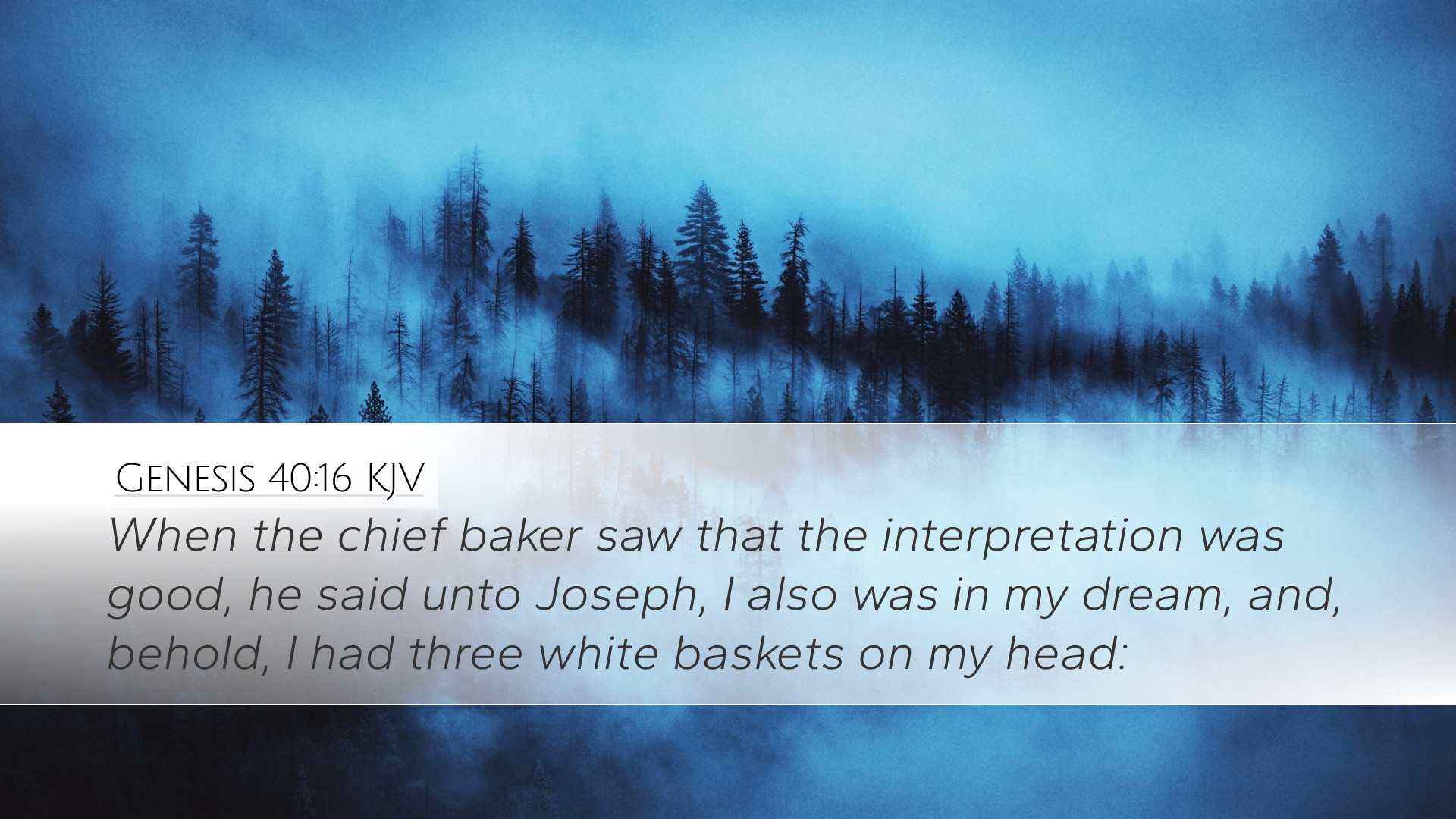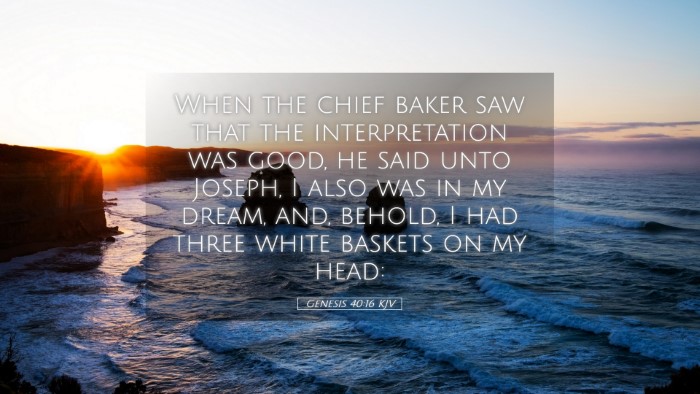Commentary on Genesis 40:16
Genesis 40:16 states: "When the chief baker saw that the interpretation was good, he said unto Joseph, I also was in my dream, and behold, I had three white baskets on my head." This verse serves as a critical pivot in the narrative involving Joseph and his fellow prisoners, specifically highlighting the baker's curiosity and need for interpretation.
Contextual Background
The significance of Joseph's experiences in prison, especially concerning dreams, cannot be overstated. Joseph had been unjustly imprisoned after being falsely accused by Potiphar's wife. In this context, the appearance of Pharaoh’s chief baker and cupbearer in the prison is a divine orchestration leading to Joseph's eventual rise to power.
Interpretations from Public Domain Commentaries
Matthew Henry's Commentary
Matthew Henry emphasizes the providential nature of God’s plan in the seemingly trivial events of life. He notes that the chief baker’s desire to share his dream reflects the human instinct to seek understanding in times of uncertainty. Henry states that the baker, having heard the favorable interpretation of the cupbearer’s dream, was emboldened to share his own, demonstrating a common desire for affirmation.
- The Role of Dreams: Henry posits that dreams in the Bible often serve as a means through which God communicates His will. In this instance, the baker's dream is not merely a personal experience but part of the unfolding divine narrative.
- Curiosity and Confidence: The baker's request for Joseph's interpretation indicates both desperation and curiosity, suggesting that people often look for hope even in dire situations.
Albert Barnes' Notes on the Bible
Albert Barnes provides a thorough examination of the symbolism in the baker's dream. He highlights the three baskets as pivotal elements that signify a short but significant period leading to the baker’s fate.
- Three Baskets: Barnes interprets the three baskets as a representation of the triadic nature of judgment in biblical literature. They demonstrate the symbolism of completeness in God's dealing with humanity.
- The Implications of Sharing Dreams: He further notes that sharing dreams can indicate a search for validation and the influence of one's surroundings, particularly the effect of witnessing a favorable interpretation.
Adam Clarke's Commentary
Adam Clarke elaborates on the narrative by contextualizing the significance of the dream in the ancient understanding of prophetic visions. He asserts that dreams held substantial importance in Egyptian culture, and thus the baker’s expedition to Joseph reveals a cultural inclination towards dream interpretation.
- Pharaoh's Kitchen: Clarke emphasizes the position of the baker as a high-ranking official and the implications his dreams could have for the Egyptian royal household.
- Expression of Desperation: Clarke interprets the baker's action as a blend of hope and desperation, reflecting a universal human behavior of seeking answers during trials.
Theological Implications
This passage provides rich theological insights, particularly concerning the nature of divine providence and human agency. The juxtaposition of the cupbearer's positive outcome and the baker's impending doom invites deeper reflection on God's sovereign will and moral order in the world.
- Divine Sovereignty: The interpretations of the baker and the cupbearer’s dreams reveal a larger narrative at play, underlining God's sovereignty over justice and mercy.
- Human Responsibility: The act of the baker revealing his dream to Joseph, after witnessing the favorable interpretation given to the cupbearer, highlights the human tendency to seek counsel based on perceived outcomes.
Practical Applications
For contemporary readers, including pastors, students, and scholars, this verse and its surrounding context serve several applications in ministry and everyday life:
- Seeking God’s Guidance: Just like the baker sought clarity, individuals today are encouraged to seek divine wisdom in their own 'dreams' or life directions.
- Understanding Bad News: The baker’s fate is eventually dire, teaching that not all outcomes to our inquiries will be positive. Understanding this can prepare believers for challenging news.
- Interpreting Life’s Events: This verse encourages a reflective approach to life circumstances, looking for God's hand in our trials as we navigate through them.
Conclusion
In summary, Genesis 40:16 serves as a profound reminder of the intersections between divine providence and human involvement in the unfolding narrative of God's plan. With insights from esteemed commentators, it draws readers into a deeper understanding of the personal and universal themes displayed in the actions of the chief baker and Joseph’s God-given ability to interpret dreams. Reflecting on this scripture leads to a richer grasp of the complexities of divine communication, the search for hope, and the implications of our choices in the face of uncertainty.


